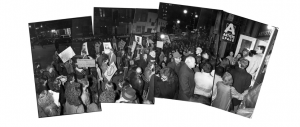Witnesses: Against Our Vanishing: Difference between revisions
(Created page with "{{Display censorship incident |ongoing=no |year=1989 |region=North America |artist=Nan Goldin, David Armstrong, Tom Chesley, Dorit Cypris, Philip-Lorca DiCorcia, Jane Dickson,...") |
No edit summary |
||
| Line 3: | Line 3: | ||
|year=1989 | |year=1989 | ||
|region=North America | |region=North America | ||
|artist= | |artist=Group Exhibition, | ||
|subject=Explicit Sexuality | |subject=Explicit Sexuality | ||
|confronting_bodies= | |confronting_bodies=Senator Jesse Helms, Representative William Dannemeyer, the Cardinal John Joseph O’Connor and other right-wing policy-makers | ||
|medium=Installation, Literature, Mixed Media, Painting | |medium=Installation, Literature, Mixed Media, Painting | ||
|date_of_action=November 16, 1989- January 6, 1990 | |date_of_action=November 16, 1989- January 6, 1990 | ||
|location=New York, NY USA | |location=New York, NY USA | ||
|description_of_content=Nan Goldin organized an exhibition | |description_of_content=Nan Goldin organized an exhibition with David Armstrong, Tom Chesley, Dorit Cypris, Philip-Lorca DiCorcia, Jane Dickson, Darrel Ellis, Allen Frame, Peter Hujar, Greer Lankton, Siobhan Liddel, James Nares, Perico Pastor, Margo Pelletier, Clarence Elie Rivera, Vittorio Scarpati, Jo Shane, Kiki Smith, Janet Stein, Stephen Tashjian, Shellburne Thurber, and Ken Tisa, in response to the AIDS crisis. The piece was entitled ''Witnesses: Against Our Vanishing'' and was deeply personal became a type of collective memorial or the artists whose lives were deeply touched by the AIDS crisis. | ||
|description_of_incident=''Witnesses: Against Our Vanishing'' included an extremely controversial essay written by David Wojnarowicz, called "Post Cards from America: X-Rays from Hell." The essay harshly criticized right-wing policy-makers who discouraged increased education of safe sex practices. He believed that an increase in sex education would decrease the threat of AIDS, and believed that by preventing people from receiving proper teaching regarding safe sex, these right-wing policy makers were perpetuating the grave issue of the AIDS crisis. | |description_of_incident=''Witnesses: Against Our Vanishing'' included an extremely controversial essay written by David Wojnarowicz, called "Post Cards from America: X-Rays from Hell." The essay harshly criticized right-wing policy-makers who discouraged increased education of safe sex practices. He believed that an increase in sex education would decrease the threat of AIDS, and believed that by preventing people from receiving proper teaching regarding safe sex, these right-wing policy makers were perpetuating the grave issue of the AIDS crisis. | ||
|description_of_result=Chairman of the National Endowment for the Arts, John Frohnmayer, was especially perturbed by "Post Cards from America: X-Rays from Hell." Because of this, he decided that the NEA would withdraw the $10,000 which they had contributed to the show. There was much dispute over the fund, but it was ultimately partially restored. The artists did not see this return of the funding as a partial victory, rather they saw it as an instance of government censorship towards AIDS-related material and art. | |description_of_result=Chairman of the National Endowment for the Arts, John Frohnmayer, was especially perturbed by "Post Cards from America: X-Rays from Hell." Because of this, he decided that the NEA would withdraw the $10,000 which they had contributed to the show. There was much dispute over the fund, but it was ultimately partially restored. The artists did not see this return of the funding as a partial victory, rather they saw it as an instance of government censorship towards AIDS-related material and art. | ||
Latest revision as of 17:02, 8 June 2017
Artist: Group Exhibition
Year: 1989
Date of Action: November 16, 1989- January 6, 1990
Region: North America
Location: New York, NY USA
Subject: Explicit Sexuality
Medium: Installation, Literature, Mixed Media, Painting
Confronting Bodies: Senator Jesse Helms, Representative William Dannemeyer, the Cardinal John Joseph O’Connor and other right-wing policy-makers
Description of Artwork: Nan Goldin organized an exhibition with David Armstrong, Tom Chesley, Dorit Cypris, Philip-Lorca DiCorcia, Jane Dickson, Darrel Ellis, Allen Frame, Peter Hujar, Greer Lankton, Siobhan Liddel, James Nares, Perico Pastor, Margo Pelletier, Clarence Elie Rivera, Vittorio Scarpati, Jo Shane, Kiki Smith, Janet Stein, Stephen Tashjian, Shellburne Thurber, and Ken Tisa, in response to the AIDS crisis. The piece was entitled Witnesses: Against Our Vanishing and was deeply personal became a type of collective memorial or the artists whose lives were deeply touched by the AIDS crisis.
The Incident: Witnesses: Against Our Vanishing included an extremely controversial essay written by David Wojnarowicz, called "Post Cards from America: X-Rays from Hell." The essay harshly criticized right-wing policy-makers who discouraged increased education of safe sex practices. He believed that an increase in sex education would decrease the threat of AIDS, and believed that by preventing people from receiving proper teaching regarding safe sex, these right-wing policy makers were perpetuating the grave issue of the AIDS crisis.
Results of Incident: Chairman of the National Endowment for the Arts, John Frohnmayer, was especially perturbed by "Post Cards from America: X-Rays from Hell." Because of this, he decided that the NEA would withdraw the $10,000 which they had contributed to the show. There was much dispute over the fund, but it was ultimately partially restored. The artists did not see this return of the funding as a partial victory, rather they saw it as an instance of government censorship towards AIDS-related material and art.
Source:
Witnesses: Against Our Vanishing November 16, 1989 – January 6, 1990
